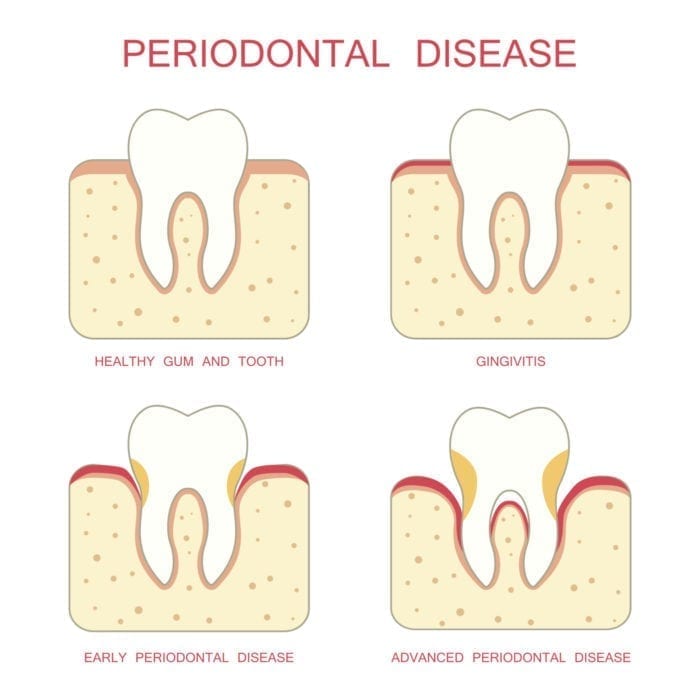Gums that bleed, appear swollen or have begun to recede are showing signs of developing periodontal disease, sometimes called “gum disease,” and should be assessed and treated as soon as possible. Dr. Robinson offers comprehensive care for periodontal disease and emphasizes the importance of healthy gums as part of preventive dental care and your overall health.
The mouth is the entryway to the entire body. Bacteria introduced to the oral cavity should not be allowed to breed and spread to the rest of the body. However, the most common symptom of periodontal disease, bleeding gums, allows this to happen. When open wounds on the gums bleed, bacteria present in the mouth are transported to other parts of the body through normal blood circulation. This makes periodontal disease one of the most concerning oral conditions that contribute to decreases in overall health.
Gum disease is referred to as a “silent disease” as it often goes undetected until significant, irreversible damage has occurred. Bleeding gums are a common indication that at a minimum, the first stage of gum disease, called gingivitis, has begun.
Periodontal disease can be largely prevented, or managed successfully if already present, with correct home care and the help of Dr. Robinson and his team. Diligent home care, including brushing twice daily along with flossing and Waterpiking once daily, is crucial to maintaining a healthy mouth. Routine dental visits to clean the areas of the mouth that are not accessible at home will help to keep your gums healthy and prevent the spread of disease-causing oral bacteria and the development of periodontitis.
Gum disease is most successfully treated in the earliest stages of development. Left untreated, gingivitis can progress to advanced periodontal disease and result in more complex dental and systemic health concerns. Because the bleeding gums associated with gum disease allow pathogenic bacteria to spread throughout the body, gum disease has been linked to an increase in other health issues including cardiovascular disease, heart attack, stroke, diabetes and pregnancy complications.
Patients with gum disease often experience:
- Chronic halitosis (bad breath)
- Tooth loss
- Receding gum lines
- Tooth sensitivity
- Swollen, tender gums

Treatment for Bleeding Gums
Dr. Robinson screens for periodontal disease as part of your routine dental exam and your hygienist performs a complete periodontal charting once per year. Treatment for gum disease is tailored to meet the needs and goals of each patient. Dr. Robinson will work with you on a one-on-one basis to achieve a healthy, stable and beautiful smile.
Periodontal treatment, a type of dental treatment sometimes referred to as “scaling and root planing” or “deep cleanings,” can help control the spread of disease causing bacteria. This procedure removes plaque and tartar buildup from all surfaces of the teeth. But more importantly, it disrupts the biofilm which harbors gum disease causing bacteria in the periodontal pockets that surround the teeth.
Dr. Robinson can identify and target which bacteria are causing your periodontal disease with a quick and painless laboratory test administered in the office. Your saliva will be sent to a laboratory for testing and the results will enable Dr. Robinson to create a customized treatment plan to address your individual disease.
In cases of advanced disease, some teeth may be lost. In these situations, treatment plans will incorporate a combination of periodontal treatment and restorative procedures to fully repair the damage caused by gum disease. Dr. Robinson is a highly skilled cosmetic and restorative dentist. He offers full-service dental implants for a natural solution to replacing missing teeth.
